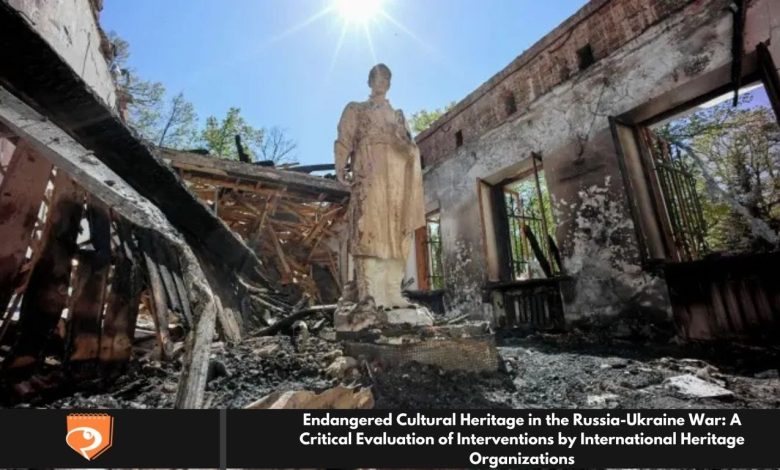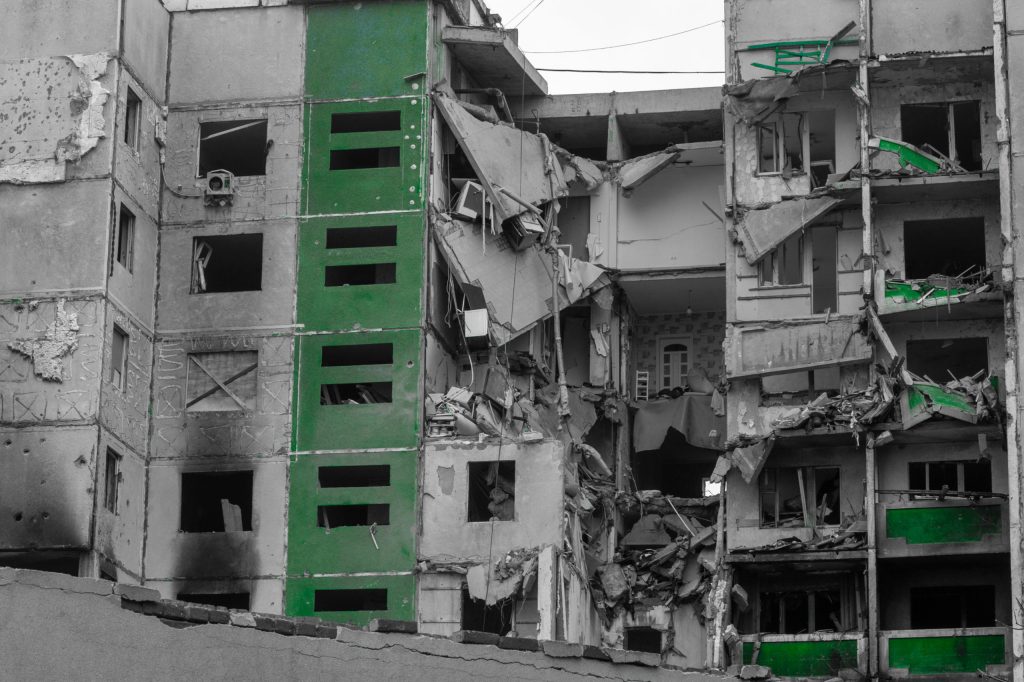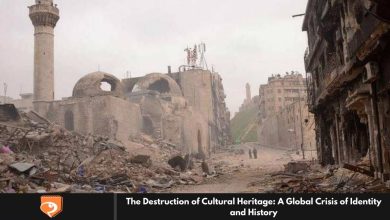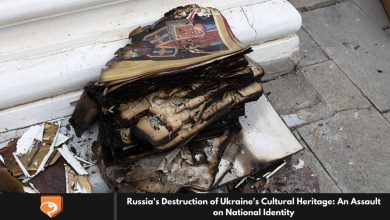Endangered Cultural Heritage in the Russia-Ukraine War: A Critical Evaluation of Interventions by International Heritage Organizations

The ongoing Russia-Ukraine war has inflicted profound damage on Ukraine’s cultural heritage, threatening priceless historical sites, artifacts, and institutions. As the conflict continues, cultural properties are not only being destroyed but are also at risk of being lost to future generations. These sites hold immense historical and national significance, making their preservation a matter of international concern.

In response to these threats, several leading global organizations dedicated to cultural heritage have intervened, issuing public statements and mobilizing efforts to safeguard Ukraine’s cultural treasures. These include the International Council on Archives (ICA), the International Council of Museums (ICOM), the International Federation of Library Associations and Institutions (IFLA), and UNESCO, each contributing in their own way to the protection of Ukraine’s heritage.
This article critically examines the early responses of these organizations, comparing their strategies, actions, and challenges in addressing the risks to Ukrainian cultural heritage. It also reflects on the broader implications of their interventions and the effectiveness of their efforts in a conflict zone, offering insights into the evolving role of international cultural heritage organizations in such crises.
Understanding the Importance of Cultural Heritage
Cultural heritage includes monuments, artworks, documents, and practices that are significant to a nation’s identity. In Ukraine, this heritage encompasses ancient churches, historical buildings, unique folklore, and vibrant art that reflects the nation’s rich history. The preservation of cultural heritage is crucial for maintaining national identity and fostering unity during times of conflict. The ongoing war poses a dire risk to these invaluable cultural assets, which are sometimes targeted deliberately as tools of war or collateral damage in the pursuit of military objectives.

The Role of International Cultural Heritage Organizations
Several global organizations focus on the protection of cultural heritage in conflict zones. Their role is not only to document and raise awareness about the threats posed to cultural assets but also to mobilize international efforts to safeguard them. Among these organizations, the International Council on Archives (ICA), the International Council of Museums (ICOM), the International Federation of Library Associations and Institutions (IFLA), and UNESCO are some of the most prominent. Their early responses to the war varied in scope and approach, yet all of them aimed to address the protection of Ukraine’s cultural heritage.
The International Council on Archives (ICA): Advocacy for Documentation and Preservation
The International Council on Archives (ICA) has emphasized the importance of preserving Ukraine’s archival materials, including historical records, governmental documents, and personal papers. The destruction of archives during conflict can erase historical memory and obstruct the functioning of a nation’s institutions. ICA’s interventions have primarily focused on advocating for the protection of these archives, offering support to Ukrainian institutions, and encouraging international cooperation to safeguard these invaluable documents.
ICA has also worked with other stakeholders to guide how archives can be stored or digitized to prevent destruction. The organization has urged international cooperation to create safe spaces for Ukrainian archives and prevent their loss in the war. Their efforts also include creating awareness among the global archival community regarding the risks and challenges faced by Ukrainian archivists.
The International Council of Museums (ICOM): Protecting Artifacts and Cultural Property
ICOM’s primary focus has been on the protection of Ukraine’s museum collections, historical artifacts, and objects of cultural significance. The destruction or looting of museums is a major concern in conflict zones, and ICOM has issued several statements urging both Ukrainian and Russian authorities to respect cultural property. Additionally, the organization has advocated for the return of looted artifacts and has worked to facilitate the safe evacuation of museum collections at risk of destruction.
ICOM has also collaborated with local Ukrainian institutions to ensure that artifacts are properly cataloged, protected, and stored. In situations where physical protection is not feasible, ICOM has supported the digital documentation of collections, allowing for their preservation and potential future repatriation. The organization has also partnered with international police organizations to track and recover stolen cultural property from the conflict zone.
The International Federation of Library Associations and Institutions (IFLA): Safeguarding Libraries and Knowledge
Libraries are critical repositories of knowledge and cultural memory, and the International Federation of Library Associations and Institutions (IFLA) has taken a strong stand in advocating for the protection of Ukraine’s libraries. These institutions hold vast collections of books, manuscripts, and digital resources that are essential for education, research, and national identity.
IFLA’s response has been multifaceted, including efforts to ensure the physical safety of libraries and the preservation of their collections. The organization has worked with Ukrainian librarians to identify high-risk areas and develop strategies for relocating or digitizing library materials. IFLA has also encouraged global library associations to provide material and financial support to Ukrainian libraries, helping them recover and rebuild after the war.
Furthermore, IFLA has promoted the importance of libraries in maintaining societal cohesion during crises and advocated for their continued accessibility to the public despite the challenges posed by the war.
UNESCO: Global Advocacy and Emergency Safeguarding Efforts
As the leading global organization for cultural heritage, UNESCO has been at the forefront of international efforts to protect Ukraine’s cultural treasures. UNESCO has called for the protection of Ukraine’s cultural heritage under international law, including the Hague Convention for the Protection of Cultural Property in the Event of Armed Conflict. The organization has also supported the monitoring and assessment of damage to cultural sites in Ukraine, producing reports on the impact of the war on Ukrainian cultural heritage.
UNESCO’s emergency safeguarding efforts have focused on providing technical assistance to Ukrainian authorities in the preservation of cultural heritage sites, as well as coordinating the international community’s response. The organization has also facilitated partnerships between governments, NGOs, and other stakeholders to protect Ukraine’s cultural property.
In addition to these immediate responses, UNESCO has called for long-term plans for the rehabilitation and restoration of damaged or destroyed cultural sites in Ukraine. The organization has highlighted the importance of cultural heritage as a symbol of resilience and national pride, urging the global community to take collective action to protect it.
Comparing and Critiquing the Interventions
While each of the organizations discussed has made valuable contributions to the protection of Ukrainian cultural heritage, there are critical differences in their approaches. ICA has focused on archival materials, an often overlooked aspect of cultural heritage, while ICOM and IFLA have concentrated on physical artifacts and libraries, respectively. UNESCO, with its broad mandate, has taken a more comprehensive approach, addressing the protection of cultural sites and property from a global perspective.
One critique of these interventions is the slow pace at which international efforts have mobilized in comparison to the speed of the conflict itself. The destruction of cultural heritage is ongoing, and many valuable artifacts have already been lost or damaged beyond repair. Moreover, the challenge of enforcing the protection of cultural heritage during active warfare remains significant, as the targeting of cultural sites is often a deliberate strategy in modern warfare.
Another critique is the lack of coordination between different organizations. While each organization has its area of focus, there is a need for a more integrated approach to cultural heritage protection in conflict zones. This could involve shared resources, joint action plans, and more consistent communication between institutions to ensure that cultural heritage is adequately safeguarded.
Frequently Asked Questions
What is cultural heritage, and why is it important?
Cultural heritage includes monuments, artifacts, documents, and traditions that hold historical, cultural, or artistic significance. It plays a crucial role in preserving national identity, fostering community pride, and providing a sense of continuity for future generations.
How has the Russia-Ukraine war endangered Ukraine’s cultural heritage?
The war has led to the destruction of historical buildings, monuments, museums, libraries, and archives, either through direct military action or collateral damage. Ukraine’s cultural sites are at risk of looting, vandalism, and irreversible damage due to ongoing conflict.
Which international organizations are involved in protecting Ukraine’s cultural heritage?
Leading organizations such as the International Council on Archives (ICA), the International Council of Museums (ICOM), the International Federation of Library Associations and Institutions (IFLA), and UNESCO have taken steps to protect Ukraine’s cultural heritage during the war.
What actions have these organizations taken to protect Ukraine’s cultural heritage?
These organizations have issued public statements, provided technical assistance, advocated for the enforcement of international laws protecting cultural property, and supported efforts to digitize or evacuate at-risk cultural assets from conflict zones.
Why is the protection of cultural heritage important during a war?
Protecting cultural heritage during wartime helps preserve the history, identity, and traditions of affected nations. The destruction of cultural sites can have lasting emotional and cultural impacts, making heritage protection essential for recovery and future unity.
How can cultural heritage be protected in active conflict zones?
Protection strategies include the digital documentation of cultural artifacts, relocation of collections to safe locations, reinforcing vulnerable structures, and promoting international legal frameworks to prevent intentional targeting of cultural property.
What legal frameworks exist to protect cultural heritage in armed conflict?
The Hague Convention for the Protection of Cultural Property in the Event of Armed Conflict (1954) is a key international legal instrument. It mandates the protection of cultural heritage during times of war and obligates parties to avoid harming cultural sites.
Has Ukraine received international support in preserving its cultural heritage?
Yes, Ukraine has received support from multiple countries, international organizations, and NGOs. These efforts include providing resources for preservation, offering expertise, and aiding in the recovery of stolen cultural property.
What are the challenges in protecting cultural heritage in Ukraine?
Challenges include the ongoing nature of the conflict, difficulties in access to affected areas, limited resources for preservation efforts, and the deliberate targeting of cultural heritage sites by the warring parties, complicating efforts to safeguard them.
What can individuals do to help protect cultural heritage during the war?
Individuals can raise awareness about the importance of cultural heritage protection, support organizations working in conflict zones, and advocate for stronger international action. Donating to relevant cultural heritage preservation charities is another way to contribute.
Conclusion
The Russia-Ukraine war has revealed the vulnerability of cultural heritage in conflict zones. While the interventions by international cultural heritage organizations have been valuable, they have also highlighted the need for more effective and coordinated efforts to protect cultural property. As the war continues, it is essential that the global community remains vigilant in advocating for the protection of Ukrainian cultural heritage and works together to create long-term strategies for its preservation.
By learning from the ongoing situation in Ukraine, cultural heritage organizations can refine their approaches to safeguarding cultural assets in future conflicts. The ultimate goal is not only to protect the physical heritage but also to preserve the intangible cultural connections that define nations and communities. As such, cultural heritage protection must remain a priority in the face of conflict, ensuring that history, identity, and cultural pride are preserved for future generations.


